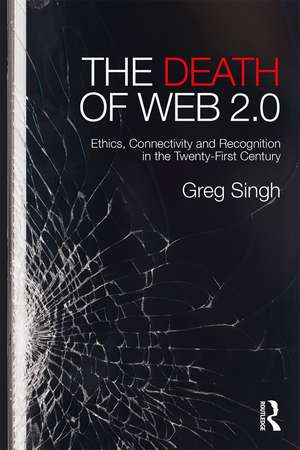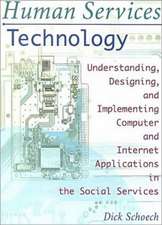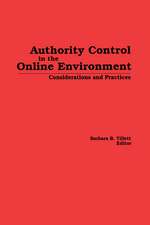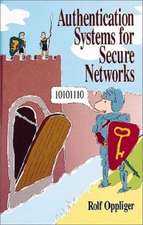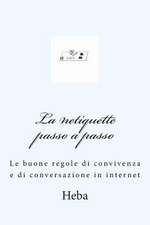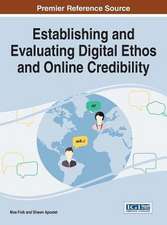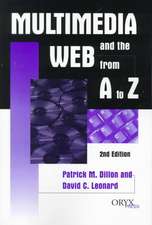The Death of Web 2.0: Ethics, Connectivity and Recognition in the Twenty-First Century
Autor Greg Singhen Limba Engleză Paperback – 10 dec 2018
Communication in today’s world is characterised by a condition of persistent, semi-permanent connectivity, which seems to bring us closer together, but which can also be profoundly alienating. The Death of Web 2.0 takes a retrospective look at a moment in recent media history that has had, and will continue to have, a lasting impact upon the predominant attitude towards cultures of connectivity. Greg Singh draws from a range of approaches, intellectual traditions and scholarly disciplines to engage key questions underpinning the contemporary communications media ecosystem.
Bringing together influences from communitarian ethics, recognition theory and relational and depth psychology, Singh synthesises key approaches to produce a critical inquiry that projects the tensions at the heart of connectivity as a principle of Web 2.0. He argues that Web 2.0 is a cultural moment that is truly over, and that what is popularly described as 'Web 2.0' is an altogether different set of principles and practices. The Death of Web 2.0 recognises the consequences of our 'always-on' culture, where judgments are made quickly and where impacts can be far-reaching, affecting our relationships, wellbeing, mental health and the health of our communities, and it concludes by asking what an ethics of connectivity would look like.
This unique interdisciplinary work will be essential reading for academics and students of Jungian and post-Jungian studies, media and cultural studies and psychosocial studies as well as anyone interested in the social implications of new media.
| Toate formatele și edițiile | Preț | Express |
|---|---|---|
| Paperback (1) | 332.89 lei 6-8 săpt. | |
| Taylor & Francis – 10 dec 2018 | 332.89 lei 6-8 săpt. | |
| Hardback (1) | 1094.68 lei 6-8 săpt. | |
| Taylor & Francis – 11 dec 2018 | 1094.68 lei 6-8 săpt. |
Preț: 332.89 lei
Preț vechi: 350.42 lei
-5% Nou
Puncte Express: 499
Preț estimativ în valută:
63.70€ • 66.68$ • 52.71£
63.70€ • 66.68$ • 52.71£
Carte tipărită la comandă
Livrare economică 05-19 aprilie
Preluare comenzi: 021 569.72.76
Specificații
ISBN-13: 9780415703802
ISBN-10: 0415703808
Pagini: 206
Dimensiuni: 156 x 234 x 18 mm
Greutate: 0.32 kg
Ediția:1
Editura: Taylor & Francis
Colecția Routledge
Locul publicării:Oxford, United Kingdom
ISBN-10: 0415703808
Pagini: 206
Dimensiuni: 156 x 234 x 18 mm
Greutate: 0.32 kg
Ediția:1
Editura: Taylor & Francis
Colecția Routledge
Locul publicării:Oxford, United Kingdom
Public țintă
Postgraduate, Professional, and UndergraduateCuprins
Acknowledgements
Introduction: Whatever happened to Web 2.0?
PART I: Connectivity and the spirit of conviviality
Chapter One
A communitarian disquisition on digital literacy
Chapter Two
Psychosocial dimensions of recognition in connectivity ethics
Chapter Three
Connectivity, creativity and other Web 2.0 myths
PART II: Recognition, self-realisation and the principle of mutuality
Chapter Four
Towards a recognition theory for social media interaction
Chapter Five
Towards a deep psychology of recognition and mutuality in always-on contexts
Chapter Six
Selfobjects and intersubjective mutuality in the contemporary media ecosystem
Chapter Seven
Social media as a false-self system
Conclusion: What would an ethics of connectivity look like? Some final notes of the death of Web 2.0
Bibliography
Index
Introduction: Whatever happened to Web 2.0?
PART I: Connectivity and the spirit of conviviality
Chapter One
A communitarian disquisition on digital literacy
Chapter Two
Psychosocial dimensions of recognition in connectivity ethics
Chapter Three
Connectivity, creativity and other Web 2.0 myths
PART II: Recognition, self-realisation and the principle of mutuality
Chapter Four
Towards a recognition theory for social media interaction
Chapter Five
Towards a deep psychology of recognition and mutuality in always-on contexts
Chapter Six
Selfobjects and intersubjective mutuality in the contemporary media ecosystem
Chapter Seven
Social media as a false-self system
Conclusion: What would an ethics of connectivity look like? Some final notes of the death of Web 2.0
Bibliography
Index
Notă biografică
Greg Singh is Associate Professor in Media and Communications and Programme Director of Digital Media at the University of Stirling, UK. His previous books include Film After Jung: Post-Jungian Approaches to Film Theoryand Feeling Film: Affect and Authenticity in Popular Cinema (both Routledge), and he has also published on topics including celebrity, YouTube and lifestyle television. Greg is Co-Director of the RSE Life in Data Research Network and is a Senior Fellow of the Higher Education Academy and a Fellow of the Royal Society of Arts.
Recenzii
"Remember Web 2.0? Its shiny promises of participation, creativity and empowerment seem a very long time ago, as social media curdle into narcissism, data mining and election fraud. Greg Singh surveys the rubble of the Web 2.0 moment, and builds a powerful argument about the ethics of connection, recognition, and twenty-first-century communication."— Graham Meikle, Professor of Communication and Digital Media, University of Westminster, UK
Descriere
Communication in today’s world is characterised by a condition of persistent, semi-permanent connectivity, which seems to connect and also alienate. In The Death of Web 2.0, Greg Singh draws from a range of approaches, intellectual traditions and scholarly disciplines to engage key questions underpinning our communications media ecosystem.
